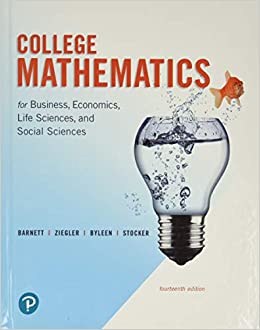Question
ma answer clearly''' Consider the following static game of incomplete information. Nature selects the type (c) of player 1, where c = 2 with probability
ma answer clearly'''
Consider the following static game of incomplete information. Nature selects the type (c) of player 1, where c = 2 with probability 2/3 and c = 0 with probability 1/3. Player 1 observes c (he knows his own type), but player 2 does not observe c. Then players make simultaneous and independent choices and receive payoffs as described by the following matrix. Player 1 Player 2 X Y A 0, 1 1, 0 B 1, 0 c, 1 a. Draw the Bayesian normal form matrix of the game b. Compute the Bayesian Nash equilibrium
Consider an extensive-form game in which player 1 is one of two types: A and B. Suppose that types A and B have exactly the same preferences; the difference between these types has something to do with the payoff of another player. Is it possible for such a game to have a separating PBE, where A and B behave differently?
Are the following statements true or false? a. An insurance company must be concerned about the possibility that someone will buy fire insurance on a building and then set fire to it. This is an example of moral hazard. b. A life insurance company must be concerned about the possibility that the people who buy life insurance may tend to be less healthy than those who do not. This is an example of adverse selection. c. In a market where there is separating equilibrium, different types of agents make different choices of actions. d. Moral hazard refers to the effect of an insurance policy on the incentives of individuals to exercise care. e. Adverse selection refers to how the magnitude of the insurance premium affects the types of individuals that buy insurance.
Suppose you estimated the following linear demand function for Nazarene University's services/products
Where Qd = annual demand for university services (in thousands of units); P = average annual price of university services (in US$); Pc = average annual price of competing university services (in US$) Y = average annual income for users of university services (in in hundreds of dollars) while A = annual advertising expenditures (in hundreds of dollars).
Required:
Interpret the coefficients of the estimated demand equation (4 Marks) Assume that P = $180; Pc = $150; Y = $700 and A = $250, determine and interpret the: Price elasticity of demand for university services (3 Marks) From your answer in (i) above, what do you think will be the effect on university revenue, of lowering the price of university services from the current $130? Support your answer (3 Marks) Cross-price elasticity of demand (3 marks) Identify and explain TWO determinants of price elasticity of demand for university services
1. Suppose Bank A has $40 million in rate-sensitive assets, $80 million in fixed rate assets, $60 million in rate sensitive liabilities, and $60 million in fixed rate liabilities and equity capital. (10 points)
a. What is the value of Bank A's GAP?
b. Calculate the change in Bank A's profit as a result of an increase in market interest rates of 2 percentage points.
c. Calculate the change in Bank A's profit as a result of a decrease in market interest rates of 1 percentage point.
d. If you had believed that rates were going to rise by 2 percentage points (before it actually happened), explain how (if at all) you could have altered Bank A's balance sheet and changed its interest rate risk exposure to improve its subsequent profit performance.
Step by Step Solution
There are 3 Steps involved in it
Step: 1

Get Instant Access to Expert-Tailored Solutions
See step-by-step solutions with expert insights and AI powered tools for academic success
Step: 2

Step: 3

Ace Your Homework with AI
Get the answers you need in no time with our AI-driven, step-by-step assistance
Get Started


